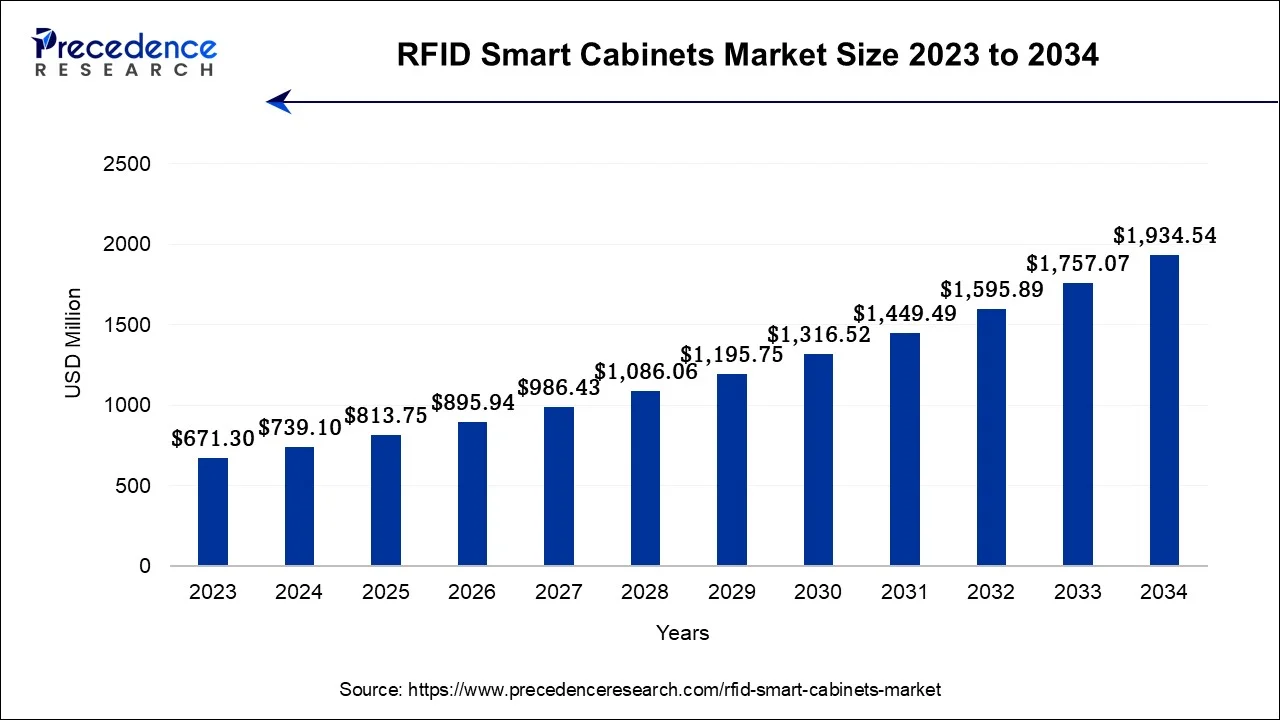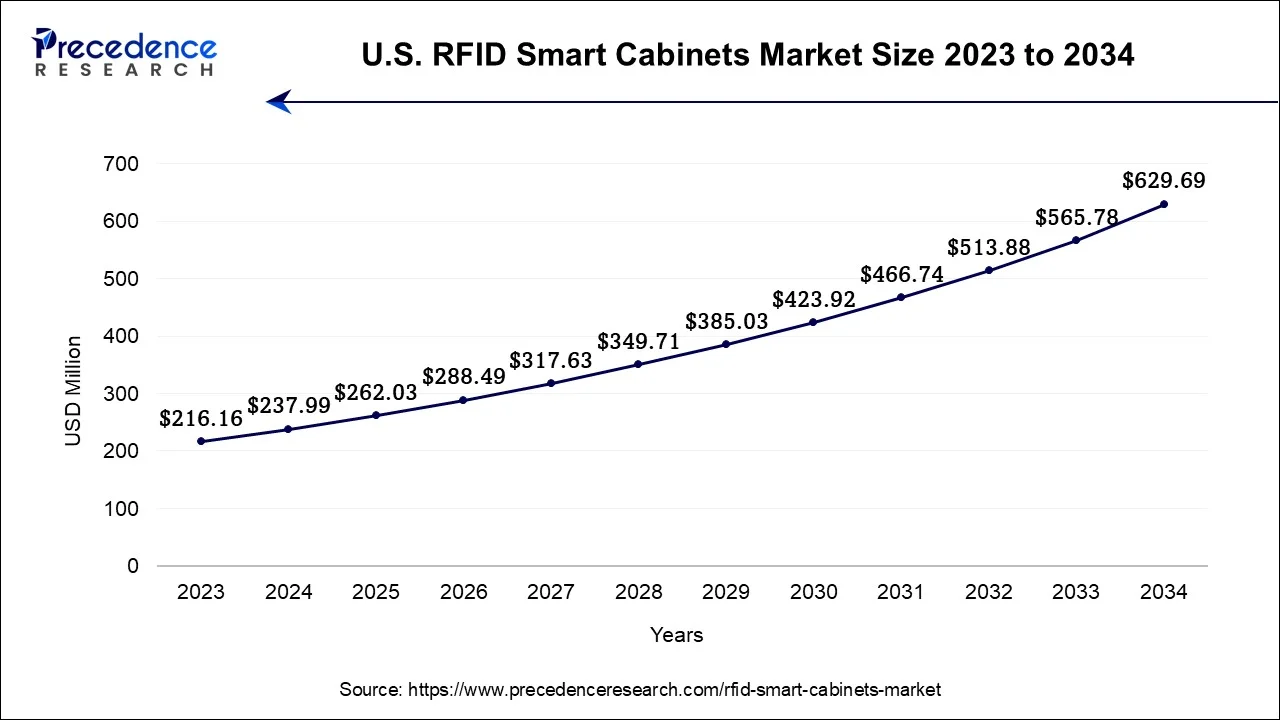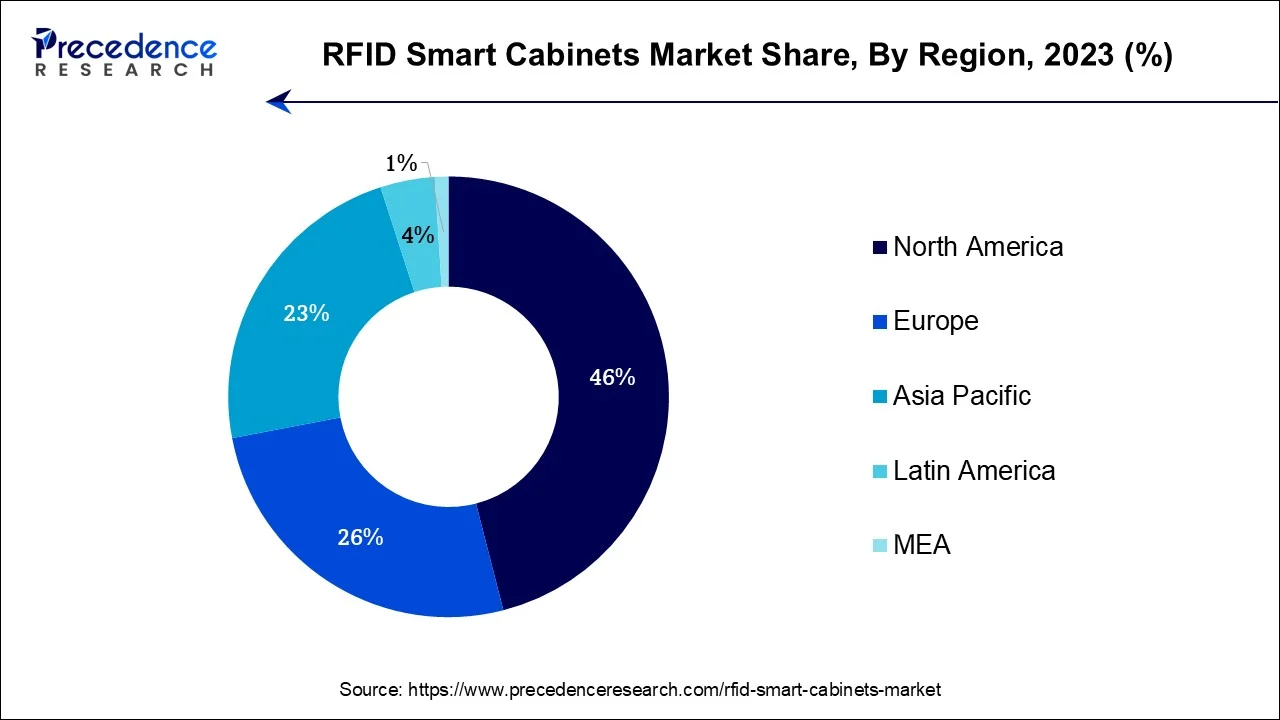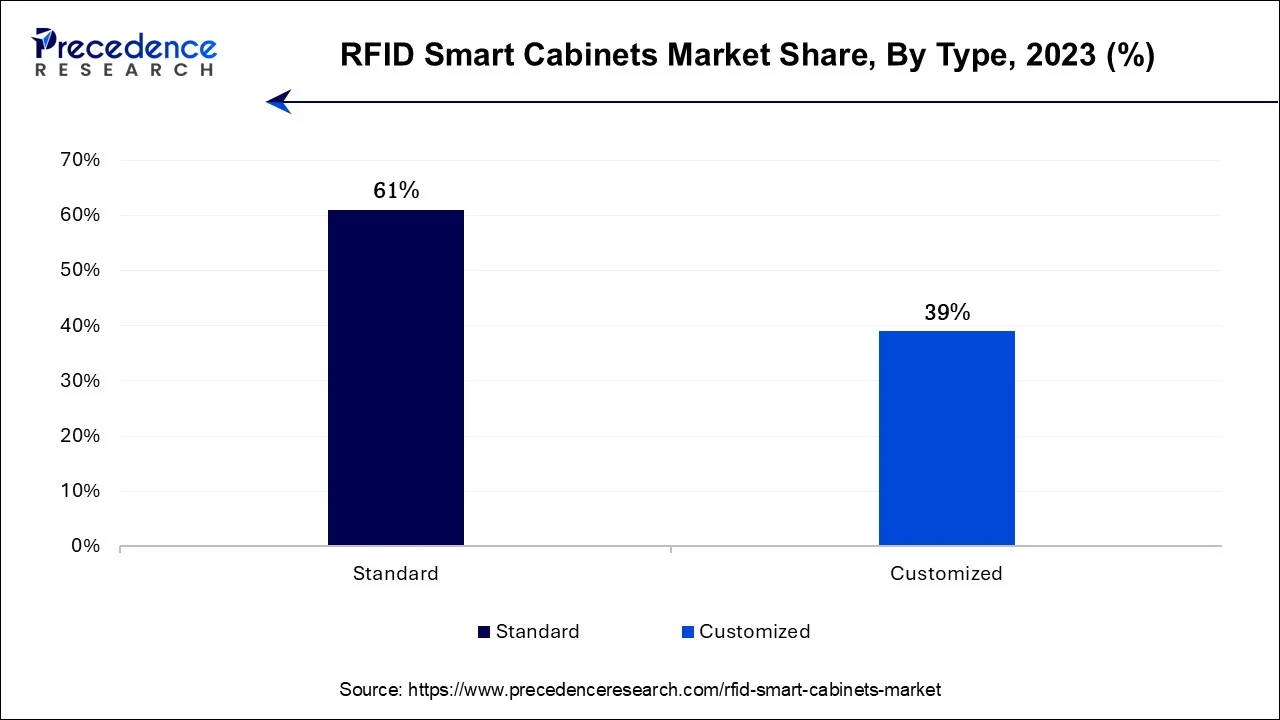January 2025
The global RFID smart cabinets market size is estimated at USD 739.1 million in 2024, grew to USD 813.75 million in 2025 and is predicted to surpass around USD 1,934.54 million by 2034, expanding at a CAGR of 10.10% between 2024 and 2034. The North America RFID smart market size accounted for USD 339.99 million in 2024 and is anticipated to grow at a fastest CAGR of 10.21% during the forecast year.
The global RFID smart cabinets market size accounted for USD 739.1 million in 2024 and is anticipated to reach around USD 1,934.54 million by 2034, expanding at a CAGR of 10.10% between 2024 and 2034.

The U.S. RFID smart cabinets market size is estimated at for USD 237.99 million in 2024 and is expected to be worth around USD 629.69 million by 2034, growing at a CAGR of 10.22% from 2024 to 2034.

North America has held largest revenue share 46% in 2023. In North America, the RFID smart cabinets market is characterized by several notable trends. The region demonstrates a high adoption rate of advanced healthcare technologies, driving the integration of RFID cabinets into healthcare facilities for streamlined inventory management. Moreover, the emphasis on patient safety and regulatory compliance propels the demand for RFID solutions. The COVID-19 pandemic further accelerated their adoption as healthcare providers prioritized efficient supply chain management. Additionally, ongoing efforts to digitize healthcare and optimize resource allocation continue to create a favorable environment for RFID smart cabinets in North America.

Asia-Pacific is estimated to observe the fastest expansion In the Asia-Pacific region, the RFID smart cabinets market is experiencing notable trends. The growing healthcare infrastructure and increased awareness of the benefits of RFID technology are driving adoption. Healthcare digitization initiatives in countries like China and India are boosting the integration of RFID smart cabinets. Moreover, the need for efficient inventory management and asset tracking in the wake of the COVID-19 pandemic has accelerated their adoption. Collaborations between local technology providers and healthcare institutions are fostering innovation, making the Asia-Pacific region a dynamic landscape for the RFID smart cabinets market.
| Report Coverage | Details |
| Growth Rate from 2024 to 2034 | CAGR of 10.1% |
| Market Size in 2024 | USD 739.1 Million |
| Market Size by 2034 | USD 1,934.54 Million |
| Largest Market | North America |
| Base Year | 2023 |
| Forecast Period | 2024 to 2034 |
| Segments Covered | Component, Type, End User, and Region |
| Regions Covered | North America, Europe, Asia-Pacific, Latin America, and Middle East & Africa |
Efficient inventory management is a paramount driver in the RFID smart cabinets market. These cabinets revolutionize the healthcare supply chain by offering real-time tracking and precise inventory data. They reduce stockouts, minimize overstocking, and enhance resource allocation. This not only ensures that critical medical supplies are readily available when needed but also optimizes operational costs. Healthcare facilities increasingly recognize the significant cost savings and improved patient care quality that RFID smart cabinets offer, thereby surging the market demand for these transformative solutions. Moreover, Patient safety is a paramount concern in healthcare, and it significantly surges the market demand for RFID smart cabinets.
These cabinets enable healthcare facilities to accurately track and manage medical supplies, medications, and equipment in real-time. By minimizing manual errors, ensuring the availability of the right items when needed, and enhancing overall inventory control, RFID smart cabinets play a pivotal role in enhancing patient safety. The demand for these cabinets is propelled by the imperative to reduce adverse events, medication errors, and ensure the highest standard of care for patients.
High initial costs present a significant restraint on the market demand for RFID smart cabinets. Healthcare facilities, especially smaller ones with limited budgets, may find the upfront investment in hardware, software, and staff training prohibitive. This financial barrier can impede adoption, preventing many institutions from benefiting from the improved inventory management and patient safety advantages offered by RFID smart cabinets. Overcoming this challenge requires cost-effective solutions and financial incentives to make these cabinets more accessible to a broader range of healthcare providers. Moreover, maintenance and upkeep represent significant restraints on the market demand for RFID smart cabinets.
These systems require ongoing attention, including software updates, hardware maintenance, and periodic calibrations to ensure optimal performance. The associated costs and resource allocation for maintenance can strain healthcare budgets. Failure to adequately maintain RFID smart cabinets can lead to system malfunctions, data inaccuracies, and operational disruptions, potentially undermining the trust and efficiency these cabinets are meant to provide, thus impeding their adoption and market demand.
Healthcare expansion, especially in emerging markets, significantly surges the market demand for RFID smart cabinets. As healthcare infrastructure grows, the need for efficient inventory management and patient care escalates. RFID cabinets offer precise tracking of medical supplies, medications, and equipment, ensuring optimal resource allocation. In expanding healthcare ecosystems, these cabinets become indispensable for enhancing operational efficiency, minimizing waste, and maintaining high standards of patient care.
The demand for RFID smart cabinets rises in tandem with the global expansion of healthcare services, making them vital components of modern healthcare facilities. Moreover, Integration with electronic health records (EHRs) significantly propels the market demand for RFID smart cabinets. This synergy ensures seamless data exchange between RFID cabinets and patient records, enhancing patient care and safety. RFID cabinets integrated with EHRs enable accurate and real-time tracking of supplies, medications, and equipment, streamlining inventory management and reducing manual errors. The demand surges as healthcare facilities prioritize efficient supply chain management and compliance with regulatory requirements, making the integration of RFID cabinets with EHRs a vital component of modern healthcare infrastructure.
By component, RFID Tags held the largest market share of 42% in 2023. RFID Tags are essential components in the RFID smart cabinets market, serving as data carriers that store unique identification information. These tags are affixed to medical supplies and equipment, allowing for accurate tracking and management within smart cabinets. A notable trend in RFID Tags is miniaturization, leading to smaller, more cost-effective, and versatile tags.
Additionally, there's an increasing focus on RFID Tags with enhanced durability and read ranges, ensuring reliable performance in various healthcare settings. These trends are contributing to the improved efficiency and accuracy of inventory management, bolstering the adoption of RFID smart cabinets in healthcare facilities.
The RFID Readers segment is projected to grow at the fastest rate over the projected period. RFID Readers, a crucial component in the RFID smart cabinets market, are devices that interact with RFID tags to capture data. They transmit radio signals to activate tags and receive information from them, facilitating real-time tracking of items within smart cabinets. Trends in RFID Readers include increased integration with IoT technologies for enhanced data collection and analytics. Moreover, advancements in reader capabilities, such as extended read ranges and improved data processing, are enhancing the efficiency of RFID cabinets, making them even more valuable for healthcare inventory management.
According to the type, the Standard RFID smart cabinets segment has held 61% revenue share in 2023. Standard RFID smart cabinets are pre-designed, off-the-shelf solutions that offer a set of predefined features and functionalities. These cabinets are readily available for purchase and deployment, providing users with essential RFID tracking capabilities. In the RFID smart cabinets market, a trend observed is the increasing adoption of standard-form cabinets by smaller healthcare facilities and clinics due to their affordability and quick implementation. These cabinets often come with basic inventory management features and are popular for their cost-effectiveness.

The Customized RFID smart cabinets segment is anticipated to expand at a significantly CAGR of 7.8% during the projected period. Customized RFID smart cabinets are tailored solutions designed to meet specific needs and requirements of healthcare facilities. They are built to integrate seamlessly with existing systems and workflows, offering advanced features and personalized configurations. A trend in the RFID smart cabinets market is the growing demand for customized solutions among larger hospitals and healthcare institutions. Customization allows these organizations to optimize inventory control, enhance security, and improve overall efficiency in a way that aligns precisely with their unique operational needs.
In 2023, the hospital and clinic segment had the highest market share of 58.6% on the basis of the installation. Hospitals, as end users in the RFID smart cabinets market, refer to healthcare facilities where these intelligent storage solutions are extensively employed. Hospitals deploy RFID smart cabinets to efficiently manage and track medical supplies, pharmaceuticals, and equipment. A key trend in this segment is the integration of RFID cabinets with hospital information systems and electronic health records (EHRs), facilitating seamless data exchange and further enhancing inventory control. Hospitals are increasingly recognizing the value of RFID smart cabinets in reducing costs, minimizing errors, and ensuring the availability of critical supplies, driving their continued adoption in healthcare settings.
The Bio-pharmaceutical companies is anticipated to expand at the fastest rate over the projected period. Bio-pharmaceutical companies in the RFID smart cabinets market refer to businesses involved in the research, development, and production of biopharmaceuticals, including vaccines, drugs, and biological products. These companies utilize RFID smart cabinets to manage and secure sensitive laboratory materials, medications, and research equipment. The trend in this sector is moving towards the integration of RFID technology to enhance asset tracking, improve compliance with regulatory standards, and ensure the efficient management of valuable biological assets. This not only streamlines operations but also contributes to maintaining the integrity and quality of bio-pharmaceutical products throughout their lifecycle.
Segments Covered in the Report
By Component
By Type
By End User
By Geography
For inquiries regarding discounts, bulk purchases, or customization requests, please contact us at sales@precedenceresearch.com
No cookie-cutter, only authentic analysis – take the 1st step to become a Precedence Research client
January 2025
January 2025
May 2024
January 2025